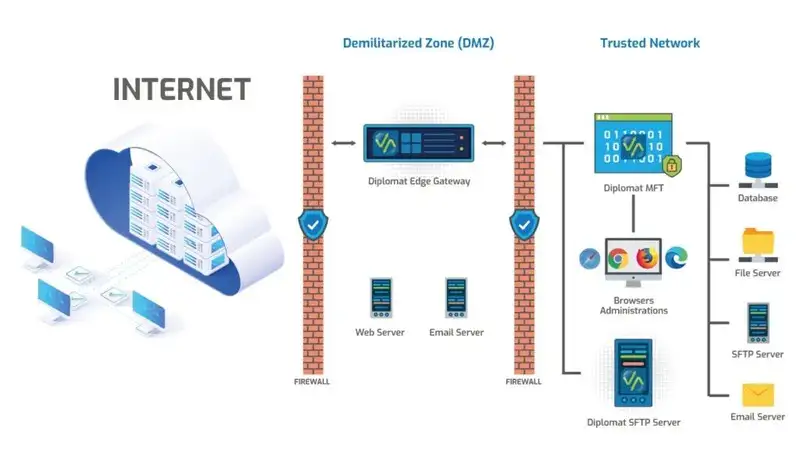In an era where data breaches and cyber threats are increasingly common, ensuring the secure transfer of sensitive information is crucial for businesses. Managed File Transfer (MFT) gateways have emerged as a vital solution for secure data exchange, providing enhanced security, compliance, and operational efficiency. This article delves into the key features and benefits of MFT gateways, highlighting their role in modern data management.
What is an MFT Gateway?
An MFT gateway is a secure, controlled entry point for managing and monitoring file transfers between an organization’s internal systems and external entities. It acts as a protective barrier, ensuring that all data entering or leaving the network adheres to security protocols and compliance requirements. MFT gateways are designed to handle a wide range of file transfer needs, from large-scale data migrations to everyday business transactions.
Key Features of MFT Gateways
- Secure Data Transmission
MFT gateways utilize advanced encryption protocols, such as SSL/TLS and AES-256, to secure data during transit. This ensures that sensitive information, such as financial records or personal data, is protected from unauthorized access and tampering. By encrypting data both in transit and at rest, MFT gateways provide a robust defense against cyber threats.
- Authentication and Access Control
To safeguard sensitive data, MFT gateways offer comprehensive authentication and access control mechanisms. These include multi-factor authentication (MFA), which requires users to verify their identity through multiple methods before accessing the system. Additionally, role-based access control (RBAC) allows administrators to define and manage user permissions, ensuring that only authorized personnel can access specific data or functions.
- Audit Logging and Monitoring
For businesses subject to regulatory compliance, maintaining detailed records of data transfers is essential. MFT gateways provide extensive audit logging and monitoring capabilities, capturing information about every file transfer, including timestamps, user identities, and file details. This level of transparency is crucial for audits, forensic investigations, and demonstrating compliance with regulations such as GDPR, HIPAA, and SOX.
- Automated Workflows and Scheduling
Efficiency is a key advantage of MFT gateways, which offer automation features to streamline file transfer processes. Automated workflows allow businesses to schedule transfers, set up recurring transfers, and manage file handling tasks such as compression, encryption, and notification. These features reduce the need for manual intervention, minimizing the risk of errors and improving overall operational efficiency.
- Integration Capabilities
Modern businesses rely on a variety of IT systems and applications. MFT gateways are designed to integrate seamlessly with existing infrastructure, including ERP, CRM, and cloud storage solutions. This integration ensures smooth data flow across systems, enhancing data accessibility and enabling businesses to leverage their IT investments fully.
Benefits of MFT Gateways
- Enhanced Security
One of the primary benefits of MFT gateways is their ability to provide a secure environment for data transfer. By implementing encryption, authentication, and access control measures, MFT gateways significantly reduce the risk of data breaches and unauthorized access. For increased security, they also offer features like data loss prevention and intrusion detection, adding additional layers of protection.
- Compliance Assurance
MFT gateways help businesses meet regulatory requirements by ensuring that data transfers are secure, controlled, and fully auditable. This compliance is crucial for avoiding legal penalties and maintaining customer trust. The detailed audit logs provided by MFT gateways are invaluable for demonstrating adherence to data protection laws and industry standards.
- Operational Efficiency
By automating file transfer processes and integrating with existing systems, MFT gateways streamline workflows and reduce the administrative burden on IT staff. This efficiency not only saves time and resources but also enhances the accuracy and reliability of data transfers, supporting better business decision-making.
In conclusion, MFT gateways are an essential tool for businesses seeking to enhance the security, compliance, and efficiency of their data transfer processes. With features like secure data transmission, authentication, audit logging, and automation, MFT gateways provide a comprehensive solution for managing sensitive information in today’s digital landscape.
